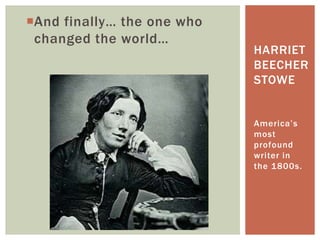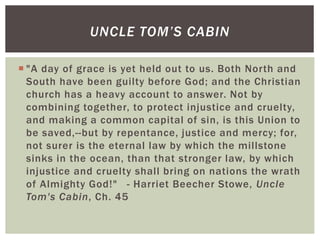Reformers ppt
- 1. Famous Dudes and Dudettes who changed the country. AMERICAN REFORMERS
- 2. Starting in the 1820s, American’s started emerging as influential and great cultural people. Only a few Americans were important to the world that WEREN’T military leaders in the past (George Washington, Andrew Jackson, William Fenemore Cooper) As in, the world didn’t care about Americans before the 1820s. As in, Americans didn’t make any global waves. As in, no one cared about America because we weren’t important. As in, Americans don’t matter. As in, this was an actual conversation: “Hey, did you hear about that American President?” “What’s America?” “You know, that chunk of land under Canada.” CULTURAL CHANGE
- 3. The spirit of reform Unification of God, man, and nature Started with the 2nd Great Awakening Makes people start focusing on bettering the world and getting right with God. As in, God likes a world that is honest and decent, so we should do the same. TRANSCENDENTALISTS
- 4. Poet, Activist Possibly America’s greatest poet. Plus, just LOOK at that BEARD!!! Served as a nurse in the American Civil War (1861-1865) Leaves of Grass Greatest work is a classic collection of his poems, WALT WHITMAN
- 5. When I heard the learn’d astronomer, When the proofs, the figures, were ranged in columns before me, When I was shown the charts and diagrams, to add, divide, and measure them, When I sitting heard the astronomer where he lectured with much applause in the lecture-room, How soon unaccountable I became tired and sick, Till rising and gliding out I wander’d off by myself, In the mystical moist night-air, and from time to time, Look’d up in perfect silence at the stars. LEAVES OF GRASS (1855)
- 6. Leader of the Transendentalist movement. Poet, essayist, lecturer, brilliant thinker. Greatly against slavery, led an abolitionist movement. Fan of bow-ties RALPH WALDO EMERSON
- 7. “To be yourself in a world that is constantly trying to make you something else is the greatest accomplishment.” “For every minute you are angry you lose sixty seconds of happiness.” “What lies behind us and what lies before us are tiny matters compared to what lies within us.” “Always do what you are afraid to do.” EMERSON QUOTES
- 8. What event started the transcendentalist movement in America? How did the rest of the world look at America before the 1800s? Who were the transcendentalists and what few things they believe in? Who is Walt Whitman? Who was Ralph Waldo Emerson and what was he talking about? CHECK FOR UNDERSTANDING
- 9. Super-Awesome female poet. Completely crazy and suicidal, rarely left her house. Wrote a bazillion poems, mostly about dark things like death and loneliness. Possibly one of the world’s greatest and most influential writers. EMILY DICKINSON
- 10. Because I could not stop for Death-- He kindly stopped for me-- The Carriage held but just Ourselves-- And Immortality. We slowly drove- -He knew no haste And I had put away My labor and my leisure too, For His Civility— We passed the School, where Children strove At Recess--in the Ring-- We passed the Fields of Gazing Grain-- We passed the Setting Sun-- We paused before a house that seemed A swelling of the ground; The roof was scarcely visible, The cornice but a mound. Since then ’t is centuries; but each Feels shorter than the day I first surmised the horses’ heads Were toward eternity. BECAUSE I COULD NOT STOP FOR DEATH
- 11. Pacifist, civil rights protestor, naturalist Believed in living at one with nature Civil Disobedience If a law is unjust, it does not have to be followed. Peaceful protesting against the government Went to jail instead of serving in the Mexican War Lived in a cabin in the woods alone for a long time to be at peace Walden HENRY DAVID THOREAU
- 12. “Most men lead lives of quiet desperation and go to the grave with the song still in them.” We all want to do great things, but we are afraid or just don’t know how to. So most of us die without making a mark on the world. “How vain it is to sit down to write when you have not stood up to live.” Most writers don’t actually do anything. Thoreau has been to jail for his beliefs and he is calling out the rest of the world to do the same. Stand up for yourself and what you believe in! “I was not designed to be forced. I will breathe after my own fashion. Let us see who is the strongest.” A government that is unjust does not deserve to exist. You can be whipped, imprisoned, punished, but those are nothing compared to being a sellout. Stand for what is right even if you stand alone. WALDEN AND CIVIL DISOBEDIENCE
- 13. America’s bizarre poet Pioneered a new kind of poetry in short, crisp lines. Poetry now something that everyone can read instead of just the super smart. HENRY LONGFELLOW
- 14. The day is cold, and dark, and dreary; It rains, and the wind is never weary; The vine still clings to the mouldering wall, But at every gust the dead leaves fall, And the day is dark and dreary. My life is cold, and dark, and dreary; It rains, and the wind is never weary; My thoughts still cling to the mouldering past, But the hopes of youth fall thick in the blast, And the days are dark and dreary. Be still, sad heart, and cease repining; Behind the clouds is the sun still shining; Thy fate is the common fate of all, Into each life some rain must fall, Some days must be dark and dreary. THE RAINY DAY
- 15. What female was one of America’s greatest poets? What topics did she write about? What kinds of things did Thoreau believe and write about? Who said “Into each life some rain must fall”? DID YOU NOTICE THAT ALL THESE DUDES HAVE CRAZY BEARDS?!? CHECK AGAIN
- 16. And finally… the one who changed the world… America’s most profound writer in the 1800s. HARRIET BEECHER STOWE
- 17. Spent years in the south and learning about the treatment of slaves on plantations. Heard many first-hand accounts of the atrocities of slavery. Wrote America’s most influential book, Uncle Tom’s Cabin, exposing the horrors of slavery to the rest of the country. No television, no music, no internet… Everyone is reading books and going to book readings. Becomes wildly popular and controversial. Exposes northerners to the evils of slavery and becomes the most important work for the abolitionist cause, angers southerners because their way is at risk. HARRIET BEECHER STOWE
- 18. "A day of grace is yet held out to us. Both North and South have been guilty before God; and the Christian church has a heavy account to answer. Not by combining together, to protect injustice and cruelty, and making a common capital of sin, is this Union to be saved,--but by repentance, justice and mercy; for, not surer is the eternal law by which the millstone sinks in the ocean, than that stronger law, by which injustice and cruelty shall bring on nations the wrath of Almighty God!" - Harriet Beecher Stowe, Uncle Tom's Cabin, Ch. 45 UNCLE TOM’S CABIN
- 19. What woman wrote America’s most controversial and influential novel in the 1800s? What book did she write? What was the book about? Why was it so upsetting? Tell me how north and south thought about it. LAST CHECK


















